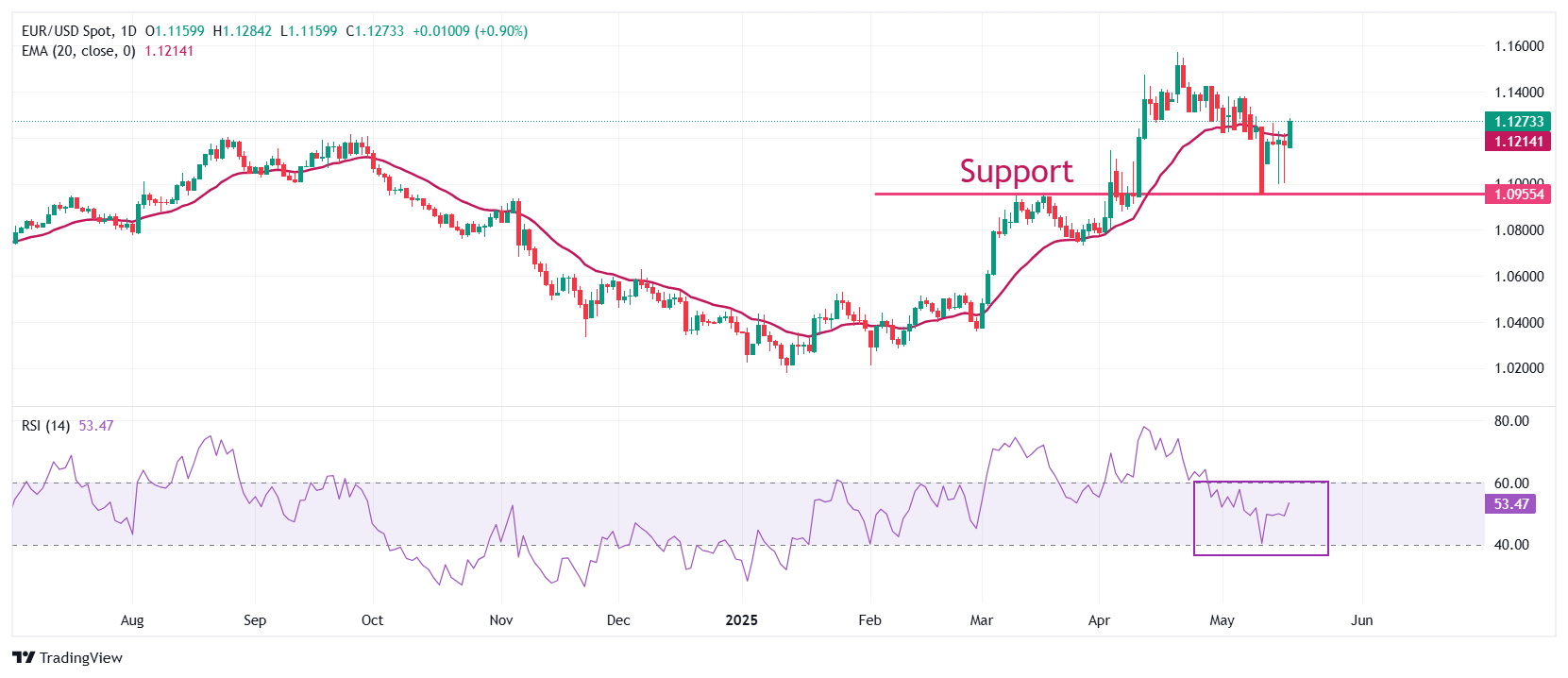提供最佳价差和条件
 关于平台
关于平台
EUR/USD surges to near 1.1270 during European trading hours on Monday. The major currency pair strengthens as the US Dollar (USD) slumps due to erosion in the United States (US) Sovereign Credit Rating. The US Dollar Index (DXY), which tracks the Greenback’s value against six major currencies, slides to near 100.20.
On Friday, Moody’s downgraded the long-term issuer and senior unsecured ratings of the US to Aa1 from Aaa. The one-notch downgrade in US Sovereign rating came on the back of mounting fiscal issues, which market experts believe the administration is unable to address in the near term.
US credit erosion has resulted in a sharp increase in Treasury yields, with investors discounting the risk premium. The 10-year US Treasury yields are up 2.3% to near 4.54%, at the time of writing. Additionally, financial market participants are worried that the so-called ‘big beautiful bill’ by the White House will further boost US bond yields.
Meanwhile, increasing optimism on a potential trade deal between the US and China is expected to support the US Dollar. Over the weekend, US President Donald Trump affirmed positively in an interview with Fox News after he was asked whether he will visit China for direct trade talks with President Xi Jinping.
On the monetary policy front, traders are increasingly confident that the Federal Reserve (Fed) will not reduce interest rates in the next two policy meetings due to elevated consumer inflation expectations in the wake of import duties imposed by US President Trump.

EUR/USD rallies to near 1.1270 at the start of the week. The near-term outlook of the pair has turned bullish as it manages to hold the 20-day Exponential Moving Average (EMA), which is around 1.1214.
The 14-period Relative Strength Index (RSI) recovers strongly above 50.00 after sliding to near 40.00, suggesting increasing bullish momentum.
Looking up, the April 28 high of 1.1425 will be the major resistance for the pair. Conversely, the psychological level of 1.1000 will be a key support for the Euro bulls.
The Euro is the currency for the 19 European Union countries that belong to the Eurozone. It is the second most heavily traded currency in the world behind the US Dollar. In 2022, it accounted for 31% of all foreign exchange transactions, with an average daily turnover of over $2.2 trillion a day. EUR/USD is the most heavily traded currency pair in the world, accounting for an estimated 30% off all transactions, followed by EUR/JPY (4%), EUR/GBP (3%) and EUR/AUD (2%).
The European Central Bank (ECB) in Frankfurt, Germany, is the reserve bank for the Eurozone. The ECB sets interest rates and manages monetary policy. The ECB’s primary mandate is to maintain price stability, which means either controlling inflation or stimulating growth. Its primary tool is the raising or lowering of interest rates. Relatively high interest rates – or the expectation of higher rates – will usually benefit the Euro and vice versa. The ECB Governing Council makes monetary policy decisions at meetings held eight times a year. Decisions are made by heads of the Eurozone national banks and six permanent members, including the President of the ECB, Christine Lagarde.
Eurozone inflation data, measured by the Harmonized Index of Consumer Prices (HICP), is an important econometric for the Euro. If inflation rises more than expected, especially if above the ECB’s 2% target, it obliges the ECB to raise interest rates to bring it back under control. Relatively high interest rates compared to its counterparts will usually benefit the Euro, as it makes the region more attractive as a place for global investors to park their money.
Data releases gauge the health of the economy and can impact on the Euro. Indicators such as GDP, Manufacturing and Services PMIs, employment, and consumer sentiment surveys can all influence the direction of the single currency. A strong economy is good for the Euro. Not only does it attract more foreign investment but it may encourage the ECB to put up interest rates, which will directly strengthen the Euro. Otherwise, if economic data is weak, the Euro is likely to fall. Economic data for the four largest economies in the euro area (Germany, France, Italy and Spain) are especially significant, as they account for 75% of the Eurozone’s economy.
Another significant data release for the Euro is the Trade Balance. This indicator measures the difference between what a country earns from its exports and what it spends on imports over a given period. If a country produces highly sought after exports then its currency will gain in value purely from the extra demand created from foreign buyers seeking to purchase these goods. Therefore, a positive net Trade Balance strengthens a currency and vice versa for a negative balance.